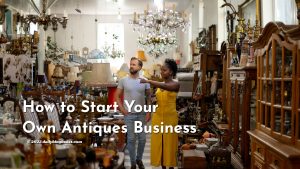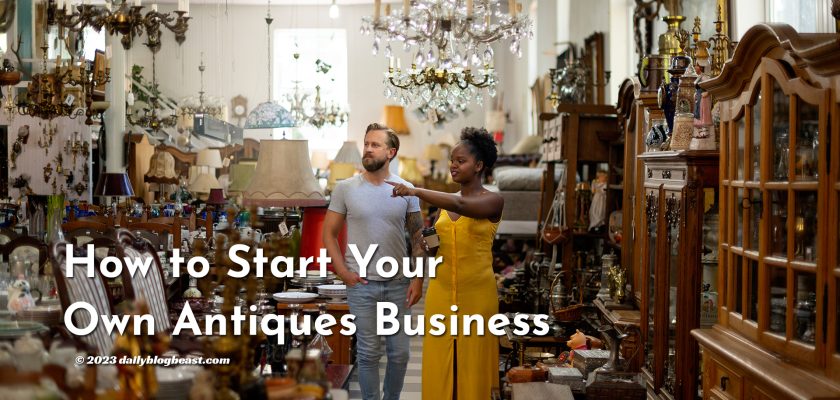The age–old question is how to open an antique store. There are some similarities with opening any other business, of course. Still, there are a few distinctions. It isn’t something you do for the money, but primarily because you are passionate about it. There is no reason the business cannot be successful, but the starting goal is never to become a millionaire, and the end result is rarely that.
Competition is ruthless. With everything going on, people are more cautious when it comes to spending, yet investing in antiques and collecting, in general, is on the rise, so…some mixed signals from the market there. You can stand out differently from the crowd, but you have to know what you are doing first. A simple love for relics won’t cut it. Therefore, allow me to impart upon you some ancient wisdom and show you how to start your own antique business.
The Usual- A Good Business Plan
It may be your dream business, but alas, it is still a business and, as such, requires careful planning and consideration. This is not the most exciting step to take, but it is the first one, and it is the prerequisite to reaching the fun part. The part deeply lodged in your daydreams before you decided to bite the bullet and start this important project. Let’s take a deep look at the elements of a business plan:

- Costs- Any explanation on how to start your own antiques business, or any other business for that matter, cannot avoid this somewhat touchy subject. Firstly, you need to have an initial inventory. You should have an online presence. And marketing will be important initially. Renting the property itself is a major one as well. Think about ongoing costs too. Those fees sure are stacking up? favorably, there are plenty of clever ways to raise cash for these expenses.
- Target- Think about your target market. You can target niches, or you can go broader. World War II memorabilia, for example, has a dedicated consumer base, but it is not that big, and you are excluding a large part of the population. If you specialize, be sure you can offer something others can’t.
- Financial forecast- This covers initial financing that we touched upon when we talked about costs, but more than that, this considers profitability. Talking about profit, here is a bonus tip for any business owner, you can earn a little extra cash through corporate credit card cashback, which is something to consider.
- ‘The Old Shop’- You also have to choose a name. It may seem trivial, but it is crucial. You are creating a brand of your own, one that will attract customers. Remember, you may be dealing with antiques, but the Internet rules supreme in this day and age. Make sure to look at web domain availability too. Also, don’t pick the first name that comes to mind, like the author of a certain post you are reading.
Distinguish Yourself
Running an antique store can be profitable, but you need to set yourself apart from the crowd. If you are only going to establish an online presence, how will your website outshine the competition? However, if you are going for a brick-and-mortar approach, what will specifically attract customers to your store? If the display in the window looks a little old (unavoidable with antiques, am I right…what, no one?), be sure to mix it up.
Swap things around to make it look like you are constantly selling and bringing in new stock. Do your customers appreciate elegance and subtlety over an over-eager staff and flashy tricks and banners? You need to understand what the competition offers, what the customers want, and find that sweet spot, where what is not offered, but is desired, is provided by you!
Location, Location, Location!
You cannot choose your store’s future location based solely on where the prices are the lowest or what’s closest to where you live. Most cities have certain hotspots that antique stores tend to cluster around. Maybe you don’t want to be in such close proximity to the competition. It makes sense.
The question is, if you are in a part of town that nobody visits with vintage records and old coin collections in mind, what have you achieved? If you have thought about the previous points that we mentioned and have managed to differentiate yourself enough, setting up in an existing, established antiques area could be the way to go.
One thing to remember, if you opt to operate in the public domain, this will almost certainly require some permits, so be sure to obtain them before setting up shop.
How to Start Your Own Antiques Business? Find the Right Staff and Equipment
You should consider what tools and equipment you will need to operate the business. If you are planning on offering restoration services, this will require additional investment, and you may need to hire the services of different workers. A large part of the job is finding new items. So, traveling will take up a large portion of your time. Furthermore, once you have acquired said items, you need to bring them back to the store.
A big and reliable car is almost a must. Card machines and retail signs fall into that category too. Look at all the tasks running an antique store entails. Put them on paper. Some things can be outsourced. A lot of people choose not to do their own bookkeeping. Why? Simply put, there are not enough hours in the day! Understand how much work there is, how much of it you can cover and how many employees you will need for the remainder.
Original Packaging
There is a running gag on many a TV show on how certain people react when something is removed from its original packaging. Antiques and collector’s items are primarily valuable due to their rarity, but this value closely correlates to their condition. The finest of care must be taken when transporting antiques. From proper packing materials to appropriate packing techniques, it is not as simple as it may seem. You must do it properly to preserve the value of the given object.
Conclusion
There are plenty of things to consider. It may even seem a little overwhelming. Still, with a bit of patience, research, and careful planning, there is no reason you cannot succeed. It won’t happen overnight, of course not. Just like any good antique, the more time that passes, the more valuable it becomes. Seems like a good parallel for our life projects; the more we work on something, the more its worth grows. Now that you see how to start your own antiques business, bravely take that first step towards achieving your goal.

